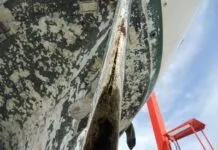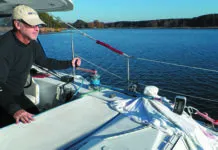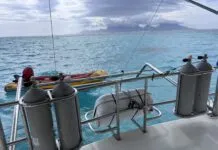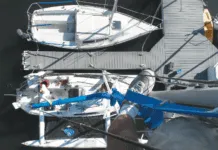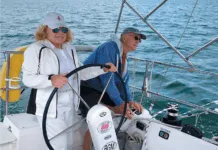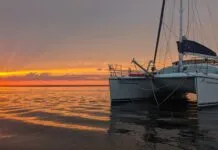
Photo by Daniel Daza
At this years U.S. Sailboat Show in Annapolis, Md., last month, I was struck by how the marketing materials sustained the illusion that the cruising life is a luxurious or easy escape.
Its not just boat shows. Books, magazines, and even Hollywood-despite its renewed fascination with realism-can’t seem to escape this romanticized view of sailing. Think of Nicole Kidman at the bow of her ketch in Dead Calm, her hair streaming in the wind. Or Kevin Costner gripping a flawlessly varnished tiller in Message in a Bottle, while some unseen hand steers from below. Even the classic Captain Ron helps perpetuate the ideal (if only my refit went so fast!).
I often wonder how a person who fully invests in this vision of smooth seas and tropical islands might react when finally confronted with the raw challenge of an ocean passage-or, more simply, life onboard itself.
Writer-director J.C. Chandors new film All is Lost, which opened in U.S. theaters Oct. 17, explores the existential drama of life at sea in a way that no sailing film has ever done. Chandor, whose 2011 feature debut Margin Call was nominated for an Academy Award, has been contemplating a sailing film ever since he crewed on a rough passage to Bermuda in his 20s. In All is Lost, he presents a deck-level view that bears little resemblance to a boat brochure. His world is the slippery deck, the clattering sail, and cold food in a can. It is a world in constant motion, confining, almost claustrophobic.
We tried to keep the camera within a bungee cord-length of Our Man, Chandor said. We wanted people to feel what it was like to be on that boat.
Our Man, in this case, is Robert Redford. His character, identified only as Our Man, is a lot like many of us, not yet accepting that our minds and bodies have aged, more confident in our decisions than we probably should be, and deeply reliant on technology. Our Man bought into the boat show version of sailing . . . and isn’t prepared for the real one, the one where bad things happen to good people.
Bit by bit, the things Our Man relies on to survive are taken away. His boat collides with a lost shipping container. Communication is cut. His GPS-his unfailing guide to life-goes blank. He is alone, exhausted, and eventually, adrift in a life raft. He confronts, in starkly real terms, his own mortality.
Many artists have long recognized the metaphoric possibilities of sailing, but few have successfully realized them in film. Chandor had to reach back to Roman Polanskis 1962 Knife on the Water to find an example of the cinematic vision he sought.
Im hopeful that Chandors film will do well in the box office, but even with Redfords star appeal, this sober approach to sailing is going to be a tough sell. Movies are an escape, and many people would rather be lulled to sleep by romantic notions than to confront harsh truths. Balancing the romance and reality remains one of the most challenging psychological tests for a long-term sailor. Its a challenge I know well, one that weve met again and again, for nearly 40 years, here at Practical Sailor.
For better or for worse, this is the last place to look for an easy escape.









